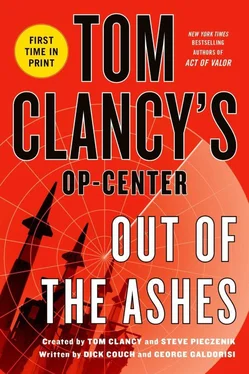“Trevor, am I being too rough on them?”
“No, Mr. President. We all let the nation down. We need to fix what’s broken.”
“But what I heard was we had bits and pieces of this information but no way to collate it so we could take action. In essence we were too slow. Is our system broken that badly?”
Trevor Harward had spent his life in the national security world. He knew the president counted on him for answers. This wasn’t the time to dance around the issues.
“Mr. President, the system works, but it just doesn’t work fast enough. The intel part works pretty well, given all the humans in the loop, but there’s a lot more that could be done with automation, high-power computing, smart digital agents, and decision-support algorithms. We also need an operations-response element that can work quicker, across all rice bowls, and that can break through choke points. This entity would need to be able to work internationally and nationally, and probably outside of legal channels when necessary.”
“Then it’s not an issue of just telling everyone to ‘work harder’ or ‘do better,’ is it?”
“I’m afraid not, Mr. President.”
“All right, Trevor. You briefed me on this when we started this journey together. I didn’t think we’d ever be here, but we are. Get me the Op-Center file.”
“I’ll do that, Mr. President, but you do know what that might entail and where it could take us?”
“I do, but do you feel we have an alternative?”
“I don’t, Mr. President. I’ll have it on your desk within the hour.”
* * *
Half a world away, Abdul-Muqtadir Kashif waited impatiently. He had instructed the Lebanese to have Azka Perkasa call him on a disposable cell phone once he reached his final destination. He had never met Perkasa, nor did he want to. The Lebanese had found him and negotiated his price, but Kashif wanted the first-person assurance, to say nothing of the satisfaction, that the deed was done. He also wanted to be certain Perkasa was well away from America and from American authorities. As agreed, just a few words would be exchanged.
“I am home,” Perkasa said.
“Just so,” the voice at the other end replied.
“Have you wired the funds yet?”
“I have instructed my agent to do so, as was agreed,” Kashif said, making no attempt to hide the annoyance in his voice. Who was this … this … hired man to question him?
The line went dead as Kashif clicked off his cell phone and climbed the steps to look in on his wife, now monitored by one of their full-time, in-home, caretakers.
“How is she?”
“No change, but she’s resting comfortably,” the woman said as she stood next to the hospital bed where the unmoving Jumana lay.
Abdul-Muqtadir Kashif walked back downstairs and turned on a news channel. The news was the same as on all channels — the attack on America. He felt no joy, just sadness for his wife, for those who would have to tend to what was left of their shattered families as he was doing, and for himself. He felt sadness, but no regret.
National Counterterrorism Center, Liberty Crossing, Virginia
(November 11, 0830 Eastern Standard Time)
Much had changed in the wake of the U.S. invasions of Afghanistan and Iraq, and then the Arab Spring. While there was some general stability in the Middle East in the twentieth century, that had changed dramatically in the twenty-first century. In retrospect, one would have thought the ouster of Saddam Hussein, Muammar Gadhafi, and Hosni Mubarak would have created a more stable region. But it hadn’t. There were new leaders with new agendas, but there was still revenge, religious tension, and greed. The only true winners in this new order were the transnational terrorist groups, which now operated openly and often with near-impunity. The national intelligence community’s job was to ensure one of these groups didn’t attack America. They had failed.
The director of national intelligence, Adam Putnam, strode into his conference room at the National Counterterrorism Center, the NCTC, at Liberty Crossing in McLean, Virginia. The leaders of the nation’s intelligence agencies were assembled in the director’s conference room on the first floor of the NCTC. His job was to coordinate the efforts of these sixteen diverse agencies. The president didn’t say it in so many words in the Situation Room, but Putnam knew the score. He had failed.
“Ladies and gentlemen, you all know why you are here. We’ve been attacked again. I brought you here because I want to hear directly from each of you. Nine-eleven was clearly a one-of-a-kind attack unlikely to be repeated in the short term. Not so this time; our nation is gripped with fear, wondering when, not if, the next attacks will occur.”
The men and women arrayed around the table were weary; they had been searching for answers but had none. Putnam listened, his impatience growing. He’d heard from everyone. He still knew nothing and he knew that wouldn’t be good enough for the president.
“Look, folks, our fellow citizens spend well north of $80 billion on intelligence every year. We’ve just endured attacks in several American cities that have killed well over a thousand of those citizens. The nation is in a virtual fetal position bracing for the next attack. There will not be another attack. Are we clear on that?”
* * *
Less than fifty miles due east of the National Counterterrorism Center, at a corner table in Miss Shirley’s café in Annapolis, Maryland, Paul Hood, former director of Op-Center, and General Mike Rodgers, his deputy director, met for breakfast. Hood was living in a waterfront home on Weems Creek near Annapolis and consulting for senior officials in several U.S. intelligence agencies. Rodgers was living on Capitol Hill and was vice president of a successful international business consultancy.
The two men were a study in contrasts. Paul Hood wore a smart, but inexpensive, blue blazer, tan pants, a buttoned-down blue shirt, a Talbot’s club tie, and tassel loafers. His outfit was often jokingly called the “uniform” in the typically anonymous intelligence community. Rogers, in contrast, was attired in an expensive blue suit, a crisp white shirt, an Ermenegildo Zegna woven silk tie, and Tanino Crisci black wingtips. Rogers was at home in the corporate boardrooms he now frequented.
Both men were plugged into the intelligence and defense communities sufficiently to know what the president and his advisors were wrestling with. It didn’t take an epiphany for them to understand why these attacks had not been prevented.
“Hell of a thing, these attacks,” Hood began.
“Yeah, to say the least.”
“You know anyone personally who died at FedEx Field?”
“Yes, actually two people,” Rodgers replied. “Good friends. Both former general officers. One working for General Dynamics and one for Northrop Grumman. Tragic. You?”
“No. No one, thank God.”
“Good.”
“Thanks for coming all the way out here, Mike. I needed to talk with you in person. Your consultancy still going well?”
“Yeah, but it’s too much damn traveling. I don’t care how you slice it, even in business class, the red-eye sucks. I’m getting too old for this shit.”
“No, Mike, you’re a warrior. You could do it in a troop seat on a C-130.”
Rodgers just shook his head and smiled. It had been years since they worked together, leading Op-Center. Both men were quietly proud of what they had accomplished. They had saved lives. Hell, they may have even saved the nation.
“Mike, I got a call from the president’s national security advisor yesterday evening. It wasn’t a secure line so he was couching what he said, but he wants me to come in and talk to the president. He hinted they’re thinking about standing up Op-Center again.”
Читать дальше












